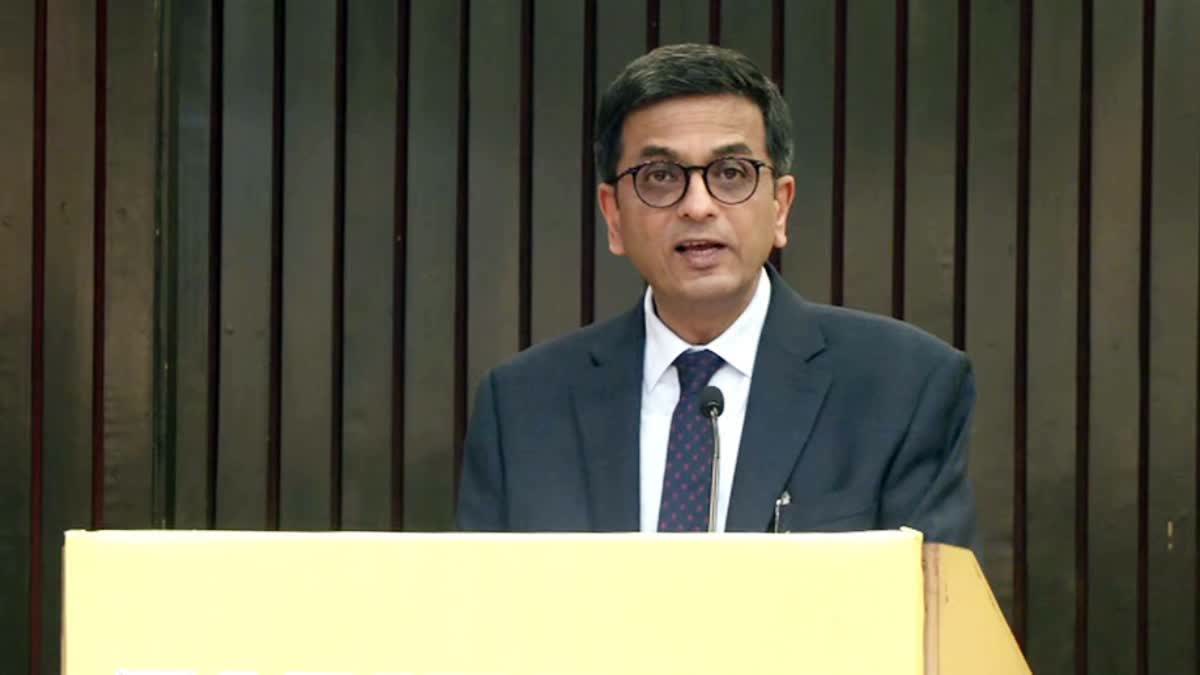New Delhi: The Chief Justice of India D Y Chandrachud has said that it is the time for countries such as India to promote a culture of commercial arbitration and stressed, “mere creation of institutions is not sufficient”, and it is essential “to ensure that these new institutions are not controlled by a self-perpetrating clique”.
Speaking at the Supreme Court of the United Kingdom, on Thursday evening, the CJI said transparency and accountability, values by which the work of conventional courts is assessed and critiqued, cannot be alien to the world of arbitration. He said it is time for countries such as India to step up to the occasion to create and promote a culture of commercial arbitration, and the robust institutionalisation of arbitration will further the culture of arbitration in the Global South.
“But the mere creation of institutions is not sufficient. We have to ensure that these new institutions are not controlled by a self-perpetrating clique. These institutions must be based on the foundation of robust professionalism and the ability to generate consistent arbitral processes”, he said.
The CJI highlighted the evolution of arbitration from a supplementary dispute resolution mechanism to a primary choice for commercial entities worldwide. “Arbitration is no longer an alternative. It is in fact the preferred method of seeking commercial justice”, he said.
During the event, Lord Reed, the President of the UK Supreme Court, extended the unique privilege to the CJI of occupying the president’s seat during his speech.
The CJI said the courts in India are overburdened despite the high courts disposing of 2.15 million cases and the District Courts disposing of 44.70 million cases in 2023. He said these figures show the trust that the people of India have in their judiciary and “our judiciary functions on the mantra that no case is small or big”.
“Every aggrieved person who approaches the doors of the judiciary has the right to a just remedy. In attending to these grievances, the courts in India perform their plain constitutional duty. The width of our jurisdiction was designed to ensure the widest access to justice. But surely every case need not find a remedy before a court, with emerging forms of dispute resolution such as arbitration and mediation gaining acceptance”, he said.
The CJI said arbitral institutions are uniquely placed to cooperate with other arbitral institutions around the world to adopt best international practices and procedures. “This will create a global convergence of arbitral procedures, creating more uniform institutional rules and structures. I hope the Indian arbitral institutions emulate the success of their global counterparts in the years to come," he said.
The CJI, reiterating that substitution of courts should not result in the creation of opaque structures, said the plea for bringing greater diversity in the world of arbitration is based on the firm belief that bringing a diversity of viewpoint to the world of arbitration whether in terms of gender or from the Global South will make for a broad-based process.
He said technology plays a major role in how the arbitration proceedings are being carried out and offers cost-effective and time-effective solutions and adoption of technology at all levels of arbitration proceedings will make the arbitration proceedings more efficient and, importantly, more accessible.
“The democratisation of the political space, access to public institutions and liberalisation of commerce has enabled private parties to converse within a structure of ordered liberty governed by the rule of law, regardless of their positions or hierarchies, on a level playing field. Arbitration provides this level playing field outside domestic court systems”, he said.
The CJI said the values of a liberal democracy enshrined in the Constitution allow people to seek individualised solutions to their legal problems outside the judicial setup, if the solutions do not violate established law, and that arbitration is one such alternative method of dispute resolution.
Read more
SC Dismisses Pleas For Review Of Dec 2023 Verdict Upholding Revocation Of Article 370



